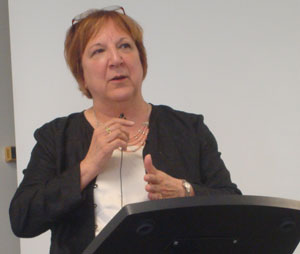 |
| Martha Crago addresses the audience at Research Mentoring Days. (Michelle Hampson Photo) |
Universities are about the transmission and generation of knowledge – but what about money to fund such generation of knowledge? How can Dalhousie researchers be more efficient at attracting funds? What are our strengths, our weaknesses? Last Monday and Tuesday, professors and post-doctoral researchers gathered for the second annual Research Mentoring Days, a conference to discuss these questions.
Martha Crago, Dalhousie’s vice president research, began the event by outlining the changing landscape of funds: prioritizing, large scale collaboration, practical applications and commercialization.
While Dal is great at securing the smaller, individual grants, there is still much opportunity to be taken in pursuing larger, strategic, and priority initiatives.
Multi-disciplinary projects
“So what do we need to do to stay competitive?” said Dr. Crago to an audience of about 75 people in the McInnes Room of the Dal SUB on Monday. “In terms of these large-scale initiatives, we need to apply them. We need to select our areas of strength.”
As an example, she noted Dal’s proximity to hospitals. "We can work together. We need to build capacity to organize, deliver, sustain, apply for these large initiatives.”
Following Dr. Crago’s opening speech, Richard Isnor, manager with NSERC-Atlantic, spoke of Dalhousie’s success of receiving money from NSERC. Although Dalhousie is great at securing funding in the category of “discovery,” it is lagging in receiving NSERC funding in the category of “innovation.”
Dean of Engineering Josh Leon, a member of the NSERC committee on grants and scholarships, outlined the qualities of a good grant application. The budget needs to make sense and have clear objectives. The merit of a proposal depends on: originality and innovation, significance and expected contributions to research, feasibility, clarity and scope of objectives.
Dr. Crago says Research Mentoring Days are important because, “people need to write grants to get research funding to be able to create knowledge and they need to understand what are the kinds of things that will compete well in an increasingly competitive grant atmosphere.”
Research Mentoring Days also allows Dal researchers to network and communicate with each other about their experiences with different types of grants.
“The hope here was to serve many parts of the community from the inexperienced to the experienced people, sharing information so that people are ready for the different stages of their granting, funding careers,” explained Dr. Crago during at break at the conference.
During lunch on the second day of the event, key speakers were people at Dal who have been successful at securing funds for their research.
Success stories
Jeff Dahn is a researcher and professor at Dal who is widely recognized for his contributions in developing the advanced lithium battery.
“I really think I've been able to be successful because I've had strong industrial collaborations ever since I've started within the university system,” he said. “And those industrial collaborations really came about because I spent time in industry for five years and really learned what was important in the battery industry and also made a network of industrial contacts during that time.”
He also pointed out that you don’t need the industry to provide 100 per cent of the funds, especially with NSERC partnership programs available.
Scott Halperin is another successful researcher who came to share his story at the event. When Dr. Halperin decided to broaden his research on pertussis to include clinical trials and vaccinations in the early 1990s, he looked to industry to diversify his research. He says he also made sure to diversify the companies funding his research to keep it accountable.
Dr, Halperin, professor of pediatrics and microbiology & immunology, established the Clinical Trials Research Centre in 1992. “We needed to really speak their language. We established another centre where we organized ourselves as a clinical research organization,” he explained. “We set ourselves up with standard operating procedures that industry would understand so that when they looked at us they would feel comfortable dealing with us.”
